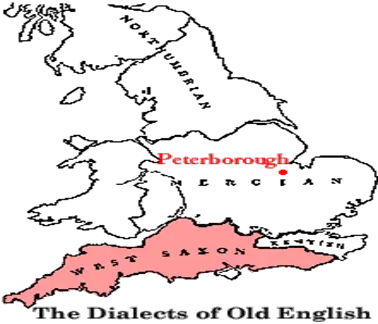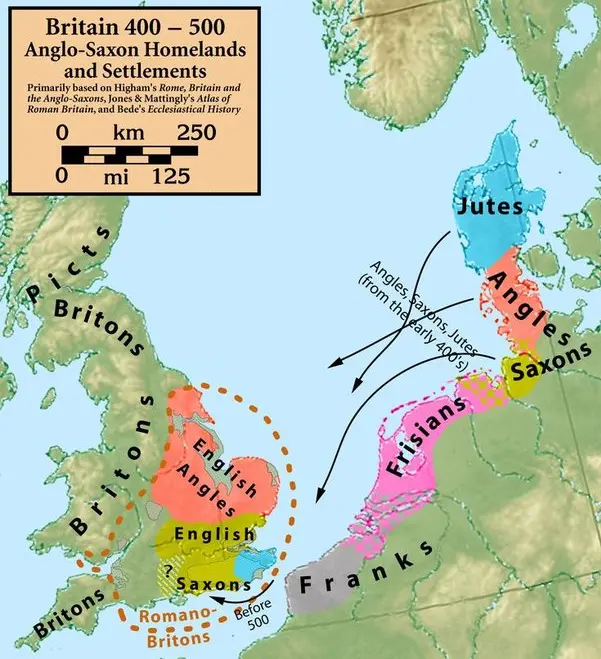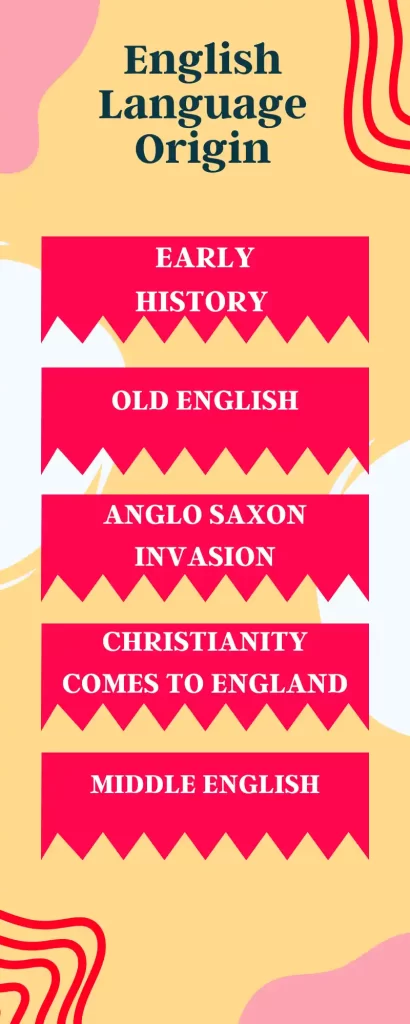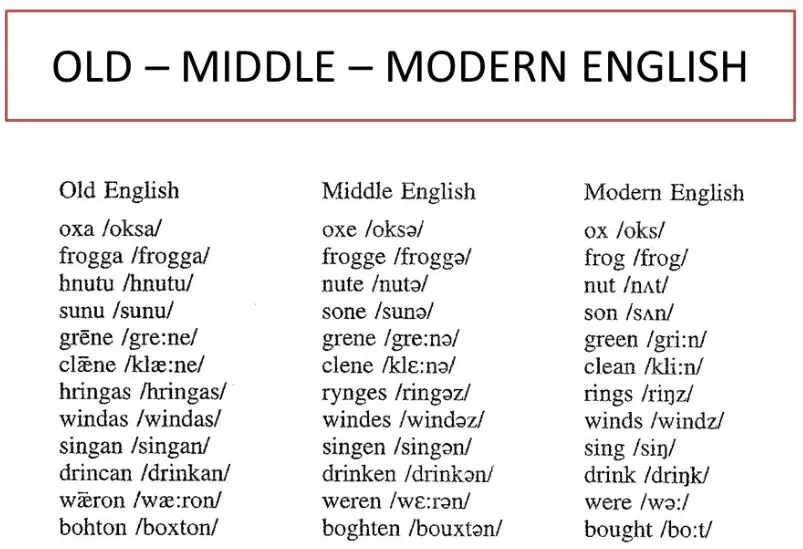Today in 2022, English is the most widely taught and understood language in the world. The English language origin is an interesting subject to explore as about 360 million people speak English as their first language, and many more million speak English as a second language.
Early History (3,000-2,000 B.C)
English language origin timeline
- Indo-Europeans came from Asia to inhabit the British Isles
- Celtic Tribes settle in the British Isles. Celtic spoke Gaelic and Brythonic (Britannic).
- Few words are left in the English language today from the Celtic languages, but we do still use golf, slogan, and whiskey from Gaelic.
Romans (led by Julius Caesar) conquered Celtic tribes in Britain in the 1st century (55 BC). In 43 AD, the Roman conquest is completed under Emperor Claudius after a 3-year military campaign and 40,000 Roman occupation force.
Romans hold political power for over 300 years (until 410 AD) and Latin functions as the “official” language of government and religion.
In 410 AD, Roman forces begin to withdraw, largely because troops are needed in other parts of Europe (eg. Germanic tribe Visigoths invade Rome in 410 AD). This left England open to attacks by Jutes, Angles and Saxons.
The Romans founded the cities – Lancaster, Manchester, Winchester, London, and Bath.
- Celtic languages are the native language of the people.
- Latin is the language of Rome and was a prestige language. Education Government Written language.
Old English (450-1100 AD)
Old English did not sound or look like English today. Native English speakers now would have great difficulty understanding Old English. About half of the most commonly used words in Modern English have Old English roots. The words be, strong, and water, for example, derive from Old English.
Old English’s Four dialects:

Here’s the middle English language origin timeline,
Anglo Saxon Invasion
Around 449 A.D., Jutes from the peninsula of Jutland in Denmark invaded the British Isles (or United Kingdom, UK). Saxons from Germany also came to the United Kingdom. Angles from Holland eventually came to the UK, too. This introduced the Germanic language to England, which is the basis of today’s Modern English.
- 449 AD Jutes, a relative small group, settle in the area of Kent.
- 477- 495 AD Saxons settle in the South (Sussex) and West (Wessex).
- 547 AD Angles (largest and most diverse group) settle in the East, central interior and the North, the areas we know today as East Anglia, the Midlands, and North thumbria.
- 793 AD Vikings invade England. The Vikings came from the three countries in Scandinavia (in Northern Europe). The Viking Age in Britain lasted for just over 200 years.
The word “English” comes from Angles.
Christianity Comes to England
Christianity Comes to England. However, St. Augustine came to England from Rome in 597 AD, and is given credit for bringing Christianity to the land. How did this impact the English language? It introduced many new religious words to the English people from the Latin and Greek languages, such as alter, mass and monk. In 400 AD, missionaries from Rome began to arrive in England, bringing with them the Latin language.
Old English: Beowulf
Around 1000 A.D. is the date of the oldest surviving example of Beowulf, a famous epic poem written in Old English. Beowulf is the first great work of the English national literature.

Middle English (1100-1500)
Norman Invasion
In 1066, William the Conqueror, the Duke of Normandy (part of modern France), invaded and conquered England. The new conquerors (called the Normans) brought with them a kind of French, which became the language of the Royal Court, and the ruling and business classes.
The Normans were descendants of Viking settlers in northern France.
For a period there was a kind of linguistic class division, where the lower classes spoke English and the upper classes spoke French for 300 years. In the 14th century English became dominant in Britain again, but with many French words added. This language is called Middle English.
The Norman invasion introduced many French words into the English language that we still use today: crown, castle, court, parliament, army, mansion, gown, beauty, banquet, art, poet, romance, chess, colour, duke, servant, peasant, traitor and governor.
With all of the different languages coming together, it’s easy to understand why the Old English language had no set spelling or sentence patterns. What a mess!
Early Modern English (1500-1800)
Towards the end of Middle English, a sudden and distinct change in pronunciation (the Great Vowel Shift) started, with vowels being pronounced shorter and shorter. From the 16th century the British had contact with many peoples from around the world. This, and the Renaissance of Classical learning, meant that many new words and phrases entered the language.
Great Vowel Shift examples
Here are some pronunciation changes from middle English to modern English.
- Feeve becomes Five
- Hoose becomes House
- Raid becomes Reed

The invention of printing also meant that there was now a common language in print. Books became cheaper and more people learned to read. Printing also brought standardization to English. Spelling and grammar became fixed, and the dialect of London, where most publishing houses were, became the standard. In 1604 the first English dictionary was published.
By the end of the 16th century, we have Modern English language. William Shakespeare and company are about to show the world what wonders can be worked with this language. (Read also: Languages of UK)
| Borrowed Language | Borrowed Words |
|---|---|
| Latin and Celtic | candle, circle, cat, mile, radish and loch, druid, car, lance |
| Anglo-Saxon | to, and, for, in, man, wife, child, fight, love, sleep, eat, house, Tuesday, Wednesday, Thursday, Friday |
| Scandinavian | egg, odd, give, anger, get, skip, skirt |
| French+Latin | judge, felon, bail, estate, dinner, supper |
| Latin+Greek | emancipate, pharmaceutic |
| Viking | lift, take, give, husband, sky, dirt, skull, leg, rotten, crawl, clasp |
| Colonial languages | pajamas, khaki |
Modern English (1800-Present)
The main difference between Early Modern English and Late Modern English is vocabulary. Late Modern English has many more words, arising from two principal factors:
- Firstly, the Industrial Revolution and technology created a need for new words;
- Secondly, the British Empire at its height covered one-quarter of the earth’s surface, and the English language adopted foreign words from many countries.
Evolution of English pronouns
Pronouns such as whom and him (contrasted with who and he), are a conflation of the old accusative and dative cases, as well as of the genitive case after prepositions (while her also includes the genitive case). This conflated form is called the oblique case or the object (objective) case, because it is used for objects of verbs (direct, indirect, or oblique) as well as for objects of prepositions.
Comparison: Old English Vs Modern English

Old English
Ærest me wæs fultumiend 7 lareow se arwurða abbad Albinus, se wæs wide gefaren 7gelæred, 7 wæs betst gelæred on Angelcynne.
Word-by-word gloss: Earliest me was assistant and teacher of the honorable abbot Albinus who was widely traveled and learned, and was the best scholar in England.
Modern English
Modern English ‘My first assistant and teacher were the venerable abbot Albinus, a man who had traveled much and studied, and was the best scholar in England’.
Read also Languages Of Indonesia.